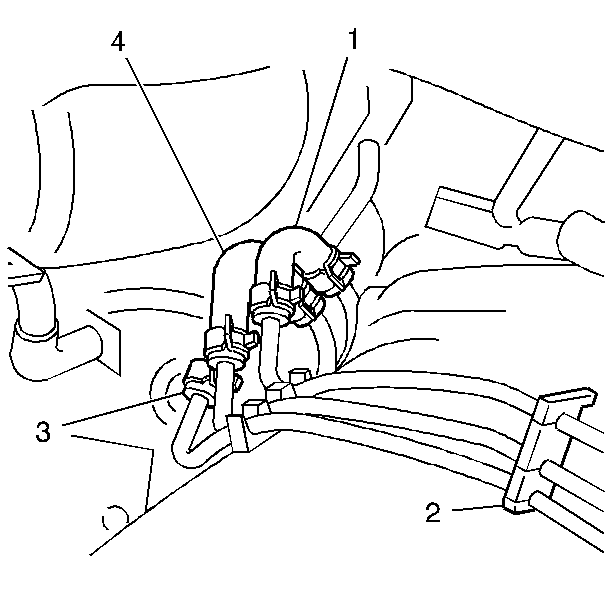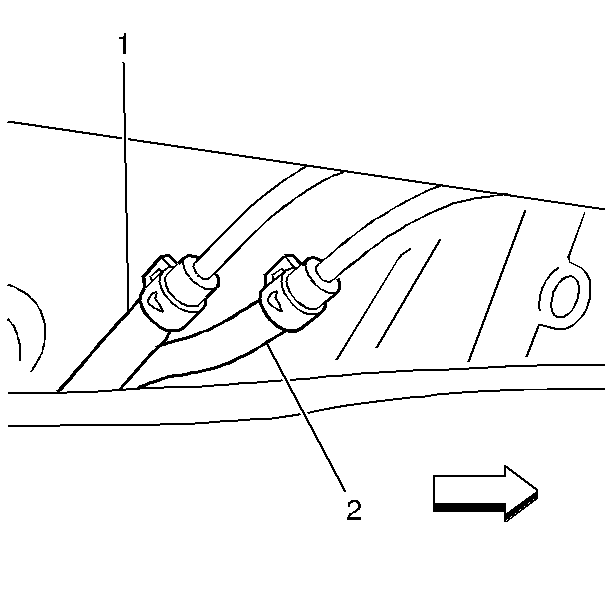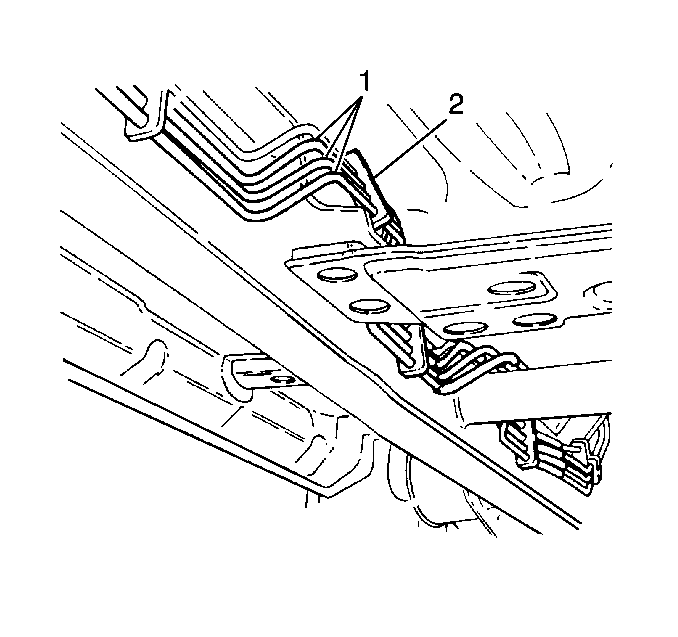Removal Procedure
- Relieve the fuel system pressure. Refer to Fuel Pressure Relief .
- Disconnect the negative battery cable.
- Disconnect the fuel vapor hose (3) from the fuel vapor pipe at the engine compartment.
- Disconnect the fuel return hose (4) from the fuel return pipe at the engine compartment.
- Disconnect the fuel feed hose (1) from the fuel feed pipe at the engine compartment.
- Disconnect the retaining clamp (2) from the fuel pipes.
- Raise and support the vehicle. Refer to Lifting and Jacking the Vehicle in General Information.
- Disconnect the fuel return hose (1) from the fuel return pipe by the fuel tank.
- Disconnect the fuel vapor hose (2) from the fuel vapor pipe by the fuel tank.
- Disconnect the fuel feed outlet hose from the fuel filter.
- Disconnect the retaining clamps that secure the fuel pipes to the vehicle chassis.
- Remove the fuel tank. Refer to Fuel Tank Replacement .
- Remove the EVAP canister. Refer to Evaporative Emission Canister Replacement .
- Remove the upper control arm from the right side of the rear suspension. Refer to Rear Axle Upper Control Arm Replacement in Rear Suspension.
- Disconnect the front driveshaft from the front differential.
- Remove the two post catalyst oxygen sensors. Refer to Heated Oxygen Sensor 2 Replacement .
- Remove the front exhaust pipe. Refer to Front Pipe Replacement in Engine Exhaust.
- Remove the center support bolts for the rear driveshaft (vehicles with two piece driveshafts only), and shift the center support to the left side.
- Remove the fuel lines.
Caution: Unless directed otherwise, the ignition and start switch must be in the OFF or LOCK position, and all electrical loads must be OFF before servicing any electrical component. Disconnect the negative battery cable to prevent an electrical spark should a tool or equipment come in contact with an exposed electrical terminal. Failure to follow these precautions may result in personal injury and/or damage to the vehicle or its components.

Caution: To avoid any vehicle damage, serious personal injury or death when major components are removed from the vehicle and the vehicle is supported by a hoist, support the vehicle with jack stands at the opposite end from which the components are being removed and strap the vehicle to the hoist.

Installation Procedure
- Install the fuel pipes (1) to the frame of the vehicle chassis.
- Secure the fuel pipes (1) with the retaining clamps (2).
- Install the rear driveshaft center support.
- Install the front exhaust pipe. Refer to Front Pipe Replacement in Engine Exhaust.
- Install the two post catalyst oxygen sensors. Refer to Heated Oxygen Sensor 2 Replacement .
- Connect the front driveshaft to the front differential.
- Install the right rear upper control arm. Refer to Rear Axle Upper Control Arm Replacement in Rear Suspension.
- Install the EVAP canister. Refer to Evaporative Emission Canister Replacement .
- Install the fuel tank. Refer to Fuel Tank Replacement .
- Connect the fuel return hose (1) to the fuel return pipe by the fuel tank.
- Connect the fuel vapor hose (2) to the fuel vapor pipe by the fuel tank.
- Connect the fuel feed outlet hose at the fuel filter.
- Connect the fuel vapor hose (3) to the fuel vapor pipe at the engine compartment.
- Connect the fuel return hose (4) to the fuel return pipe at the engine compartment.
- Connect the fuel feed hose (1) to the fuel feed pipe at the engine compartment.
- Connect the retaining clamp (2) to the fuel pipes.
- Connect the negative battery cable.

Notice: Use the correct fastener in the correct location. Replacement fasteners must be the correct part number for that application. Fasteners requiring replacement or fasteners requiring the use of thread locking compound or sealant are identified in the service procedure. Do not use paints, lubricants, or corrosion inhibitors on fasteners or fastener joint surfaces unless specified. These coatings affect fastener torque and joint clamping force and may damage the fastener. Use the correct tightening sequence and specifications when installing fasteners in order to avoid damage to parts and systems.
Tighten
Tighten the center support fasteners to 68 N·m (50 lb ft).


Caution: Unless directed otherwise, the ignition and start switch must be in the OFF or LOCK position, and all electrical loads must be OFF before servicing any electrical component. Disconnect the negative battery cable to prevent an electrical spark should a tool or equipment come in contact with an exposed electrical terminal. Failure to follow these precautions may result in personal injury and/or damage to the vehicle or its components.
